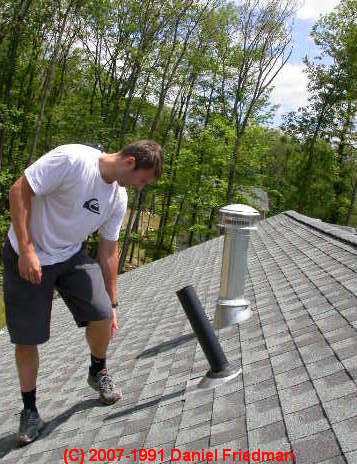Choosing a whole house fan.
Roof vent installed backward.
Here our roofing repair experts share the steps for how to install a roof vent.
The rvk1a steel roof cap kit is an the rvk1a steel roof cap kit is an easy to install vent for ventilation fans bath rec room home gym etc.
The lower half of the flange sits on top of the shingles.
Center the vents on the peak of your roof so the sides of the vent lay flat on the roof.
Use enough vent pieces to fill the length of the slot you cut.
These vents are installed in the soffit the enclosed portion under the roof overhang and permit air to flow up under the roof and into the attic.
Apply a bead of asphalt roof cement on the bottom of the vent.
A drip edge vent is made of a corrosive resistant material that sticks out about three inches back from the roof edge and then bends downward over them.
Drip edge vents are a two in one installation that promote water shedding at the eaves and rakes of a roof while also allowing for ventilation into the attic.
First off i m not a professional roofer this is for the diy jack of all trades guys and gals out there.
Ardons roofing demo 10 off 5 years warranty.
Set the ridge vents on top of the slot.
It is compatible with 3 or 4 ductwork and includes a 3 to 4 adapter for convenience.
If you need to cut the vent to fit at the end of your roof use a utility knife to make it flush with your home.
Nail the lower corners with roofing nails and tar the heads.
This cap features both a back draft damper and bird screen preventing outside air from entering the home and birds and small pests from entering duct work.
Luckily these vents are easy to find at your local home improvement store and easy to install using just a few tools.
Roof vents can help exhaust moisture from inside your home due to a kitchen bathroom laundry room and more.
Slide the vent under the shingles so they cover the top half of the vent flange.
The building codes and building science for.
This video details how to install roof vents in a r.
Vent roofs with steeples towers or cupolas can be found in different buildings from barns to cathedrals.
They range in style from 6 inch round stainless steel vent covers that are placed in the soffit between each rafter to continuous vents that run the entire length of the soffit.
The idea of roof vents existed for hundreds of years with natural vents employed in chinese buildings during the tang dynasty natural ventilation ducts in the buddhist monks caves and wind catchers incorporated in arabian architecture.

